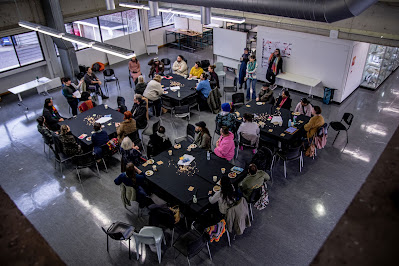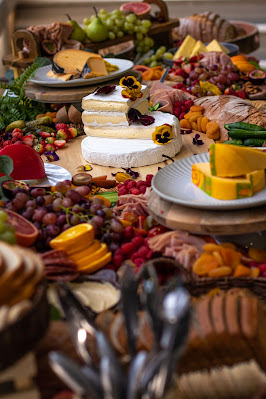Keeping it Real: Seat at the Table – University of Canberra Creative Recovery and Resilience Forum, at UC Building 7 (Faculty of Arts and Design), Saturday June 4, 2022.
Producer – Kiri Morecombe
Forum Facilitators – Ketura Budd, Nick Delatovic, Zora Pand and Tom Campbell
Pitch Lab Facilitators – Lavanna Neal and Adam Deusien
Participants – some 40 local artists in conversation about challenges, strategies, connections and support for the arts sector.
Forum Writer-In-Residence – Simone Penkethman
Keeping it Real is the final event in the Creative Recovery and Resilience Forum’s 2021-22 series as part of the ACT Government’s Creative Recovery and Resilience Program.
Reviewed by Frank McKone ____________________________________________________________________
The Context:
Released 12/07/2021
Canberra’s arts industry will be given a boost through the Creative Recovery and Resilience Program, which will support the ACT arts industry to recover from the effects of COVID-19, build capability within the sector and create jobs.
Minister for the Arts Tara Cheyne said the Creative Recovery and Resilience Program, with more than $700,000 in funding, will focus on employment and economic stimulus for Canberra’s creative sector.
A number of different initiatives will be delivered under the program over the next 12 months to empower the arts industry to recover and respond to the emergent opportunities created by COVID.
“The arts are an essential part of our lives and contribute immensely to the economic, cultural and societal value of our community,” said Minister Cheyne.
https://www.cmtedd.act.gov.au/open_government/inform/act_government_media_releases/cheyne/2021/canberras-creative-recovery-supporting-jobs-in-the-arts
At https://creativeact.org.au/forum/ you may find my relatively ancient face among the many, such as:
11-year-old “Ghos7” who operates online as a “Day Disco DJ”;
through people such as Ruth O’Brien who I am aware of as an actor and musician with Rebus Theatre and is now focussing on “Mary Violet Creative”, hosting online workshops and events and providing support for artists with the business and administrative sides of their work through coaching and providing arts admin outsourcing services;
to Kirandeep Grewal who is a multi-disciplinary artist and an art educator based in Canberra. Her art practice is based upon a meditative approach to everyday life. It is a learning and sharing journey of her work which also encourages others to engage with art. Her preferred medium is silk on which she explores colours. Her designs on silk scarves, wall hangings or paintings are a combination of various techniques, including Shibori, Indian tie-and-dye, free hand drawing/painting and embroidery.
Juliette Dudley demonstrates what it’s all about pictorially:
I approached my Seat at the Table a little unsure of my place as a mere critic among so many creatives. But there is a far wider perspective than just the arts sector, when you find on line at https://scholar.google.com.au/scholar?q=national+recovery+and+resilience+plans&hl=en&as_sdt=0&as_vis=1&oi=scholart a huge stack of academic articles, especially from Europe and Japan, about national recovery and resilience plans from many different angles.
And, yes, we have one: The Australian Government launched the National Recovery and Resilience Agency on 5 May 2021 to support local communities to respond to major disasters. The new agency will assist communities with relief and recovery efforts following large-scale natural disasters.7 May 2021
https://www.pmc.gov.au › news-centre › domestic-policy
And we have one for the Australian Capital Territory, at https://www.act.gov.au › actrecovery which includes $711,000 for a new Creative Recovery and Resilience Program (CRRP); designed to focus on employment and economic stimulus for the creative sector in the ACT. Six new projects include
> this CRR Forum (University of Canberra);
> CRR Residences in Digital Innovation and Cross-Sector Engagement (University of Canberra (UC) and Belconnen Arts Centre (Belco Arts);
> Residencies in Aboriginal and Torres Strait Islander Arts and Cultural Practice, and Community Arts and Cultural Development (Ainslie + Gorman Arts Centres);
> City Commissions (Contour 556);
> Arts Infinity Lab (Paper Giant);
> Good Company (You Are Here);
and an ACT Government Creative-in-Residence Project delivered by artsACT (A six month residency for 2 creatives – Ketura Budd, Nick Delatovic – in an ACT Government Directorate.)
Today’s Forum was M/C’d by Ketura Budd, explaining that the frame for the two hours’ discussion – in groups of 10 around 4 tables – should be respectful inclusion, the collective nature of the arts, sharing and connecting with each other.
She had mixed the participants on each table to provide a likely diversity of ideas and arts experience, and listed a number of issues which we were likely to cover – though with no constraints:
Getting beyond the known knowns such as -
Being underfunded;
Being underpaid;
Getting past barriers;
Working voluntarily;
Disbelief – questioning arts as not really a job;
Working from home;
Arts as intrinsically valuable;
And concluding with the premise that each arts person here today is equally valuable.
When I asked about my status as a reviewer, it was promptly made clear that reviewing is creative, too. The warmth of acceptance was a strength of the afternoon’s experience.
My table was facilitated by Tom Campbell, who began with a brief story of his personal background and art work, inviting us each to speak in turn. Telling our stories, though just in two or three minutes each, quickly brought us together: despite the proximity of the other three tables, their voices were not interrupting our concentration as we absorbed quite different personal stories and personalities. Opening up for presenting ideas and responses came easily. Tom’s quiet approach gave us freedom to speak: facilitation was the right word.
Though two or three people from each table reported on their discussions to the whole gathering at the end, each with positive feelings about the exercise, but raising different specific points, I can only write in some depth from my own table.
As the real creatives spoke, some from the perspective of ‘community workshop’ arts actvities, others from the ‘arts creation or performances as small businesses’ perspective, I began to see the problem of government focussing on the economics of the ‘arts sector’.
 | |
| Slow Stitching community arts activity led by Kiran Grewal and Michele Grimston of the Migrant Women's Art Group Photo: Simone Penkethman |
A crucial point is that the coming together of people to do art is its value in itself. Even if, as one speaker said, trying to do it is ‘terrible’ (perhaps because of the process; or perhaps because the result is not artistically successful), it is the experience of doing it which can change what you understand, what you feel, and what you think; while bringing the people involved together through that experience.
This is as true for the image above of Kirandeep Grewal and Michele Grimston from the Migrant Women’s Art Group leading an exploratory workshop-style activity at the Belconnen Arts Centre as it was for another speaker describing the difficult process of running a nine-piece band, managing the financial arrangements at the same time as creating and then performing the music.
The important point that arose from peoples’ stories and thoughts in response was that each as an artist worked with a strong sense of responsibility to others. Leadership in the arts is quite different from leadership as we often see it in business. This is because the focus for business is on the profit-making of the venture; while – in the example of the nine-piece band – arrangements are worked out for the artists to manage the money in a cooperative way because the focus is on the making of the music.
The result of the focus on profit/loss is that leaders are in a position where caring about their employees, or about the customers for their product, or even about the quality of their work, is set to one side. Recent cases I thought of, for example, are Mark Zuckerberg (Facebook / Meta) and Jeff Bezos (Amazon); and probably Clive Palmer and his ‘United Australia Party’. In a sense, I thought, these entrepreneurs are ‘creatives’, but they are not like the people I was hearing at my table. In the end the emphasis on the arts economy is quite the wrong way to consider the value of the arts to our community. Those business and political ‘leaders’ become engrossed in their personal wealth and political power; while as speakers at my table said, making my art is central to my person – and that is its value, not only to me but to all those others who work with me and others who see my art.
There is a generosity in art; and I felt today that our local government, in setting-up and financially supporting the Creative Recovery and Resilience Program – and especially in the manner in which today’s Seat at the Table Forum was conducted – has shown the importance of the arts to our whole community.
At the national level, of course, I trust that the newly elected government will take up its responsibility to arts in the community, by the community and for the community. Starting, I hope, with rethinking the role, funding and management of the Australia Council.
Instead of a competitive model for grant applications, we need a readiness model already in place in the ACT CRRP, where ArtsACT staff can personally assist artists with putting together their applications, especially on how to acquit the grant money and the complexities of accounting for the GST – so that the artists can keep focus on making the music in recovery from shocks like Covid-19, and with continuing resilience into the long-term future.
I would like to conclude with my thanks to all the people who sat with me at my table – that is, at our table(s) – and all those from ArtsACT and the University of Canberra who made the day happen.
 |
| Keeping it Real - Seated at the Tables Photo: Tobias Price |
 |
| Keeping it Real - Refreshments Photo: Tobias Price |

